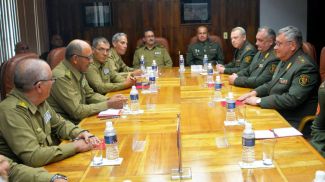MINSK, 18 June (BelTA) – Members of the House of Representatives of the National Assembly of Belarus gave the first reading to amendments and addenda to the martial law on 18 June, BelTA has learned.
While presenting the document, Belarusian Defense Minister Yuri Zhadobin remarked that the amendments to the existing law are particularly topical in modern conditions in view of the nature of existing threats and challenges.
The bill envisages a military threat or an attack against Belarus as a condition for declaring martial law. Martial law can be declared and annulled by the president of Belarus. The decree on declaring or annulling martial law has to be published right away and distributed via mass media or other public means of communication.
Yuri Zhadobin pointed out that for the sake of wartime posture and military censure the bill prohibits the creation of new political parties, other public associations, their unions for the duration of martial law. The bill also prohibits the publication of mass media except for those chosen by the Belarusian Information Ministry.
Parliamentarian Ilya Murashko asked why an act of armed aggression by a country or a group of countries against any member of the Collective Security Treaty Organization is classified as a military threat for Belarus.
The Belarusian Defense Minister responded by saying the same provision is part of all the similar legal acts on military and military political unions. “It is the custom in the CSTO, too. Our Russian colleagues have already passed a similar bill in the first reading. Our other allies in the CSTO will do the same because the union cannot exist without this norm,” explained the Defense Minister.
The document stipulates measures to secure martial law. Procedures for using the army, other armed units, and militarized organizations are stipulated as well as procedures for using weaponry, military and special hardware, special means, and physical force.
Apart from that, the bill specifies when military personnel and personnel of government agencies employed to enforce martial law can use weaponry, military and special hardware, special means, and physical force.
In particular, weaponry, military and special hardware, special means, and physical force can be used to resist an assault upon a military installation, military personnel and other natural persons. They can be used to prevent illegal infiltration of guarded installations and deployment sites, release hostage, free captured installations, vehicles and cargoes, prevent mass riots, sound an alert or call for aid.
While presenting the document, Belarusian Defense Minister Yuri Zhadobin remarked that the amendments to the existing law are particularly topical in modern conditions in view of the nature of existing threats and challenges.
The bill envisages a military threat or an attack against Belarus as a condition for declaring martial law. Martial law can be declared and annulled by the president of Belarus. The decree on declaring or annulling martial law has to be published right away and distributed via mass media or other public means of communication.
Yuri Zhadobin pointed out that for the sake of wartime posture and military censure the bill prohibits the creation of new political parties, other public associations, their unions for the duration of martial law. The bill also prohibits the publication of mass media except for those chosen by the Belarusian Information Ministry.
Parliamentarian Ilya Murashko asked why an act of armed aggression by a country or a group of countries against any member of the Collective Security Treaty Organization is classified as a military threat for Belarus.
The Belarusian Defense Minister responded by saying the same provision is part of all the similar legal acts on military and military political unions. “It is the custom in the CSTO, too. Our Russian colleagues have already passed a similar bill in the first reading. Our other allies in the CSTO will do the same because the union cannot exist without this norm,” explained the Defense Minister.
The document stipulates measures to secure martial law. Procedures for using the army, other armed units, and militarized organizations are stipulated as well as procedures for using weaponry, military and special hardware, special means, and physical force.
Apart from that, the bill specifies when military personnel and personnel of government agencies employed to enforce martial law can use weaponry, military and special hardware, special means, and physical force.
In particular, weaponry, military and special hardware, special means, and physical force can be used to resist an assault upon a military installation, military personnel and other natural persons. They can be used to prevent illegal infiltration of guarded installations and deployment sites, release hostage, free captured installations, vehicles and cargoes, prevent mass riots, sound an alert or call for aid.













